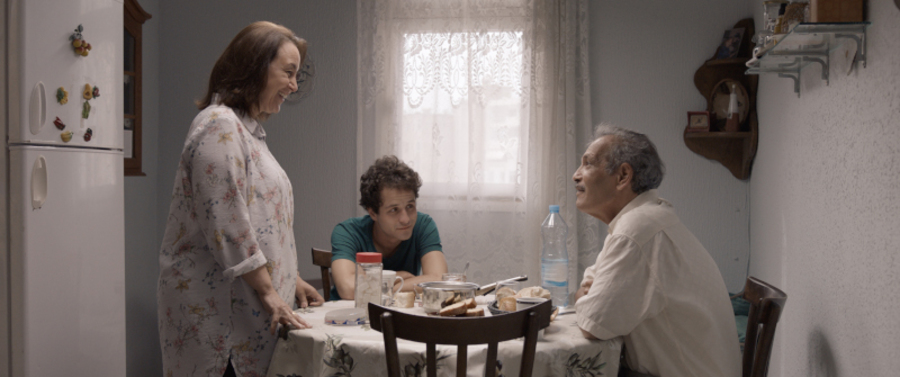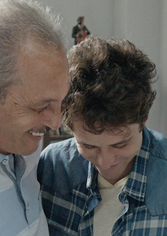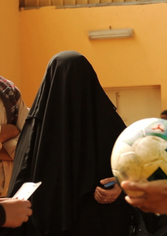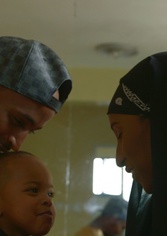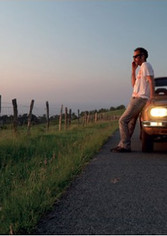Films
Index / Activities / Films / Arab cinema returns to Cordoba
Arab cinema returns to Cordoba
From September 13, 2019 until October 18, 20197:30 p.m.
CORDOBA
Casa Árabe Auditorium (at Calle Samuel de los Santos Gener, 9).
7:30 p.m.
Free entry until the event’s capacity is reached.
Films shown in the original language version with subtitles in Spanish.
Casa Árabe is continuing its commitment to cooperate with the African
Film Festival of Tarifa-Tangier (FCAT) by contributing to increased
awareness and support for recently produced Arab film. The films can be
seen at our Andalusian headquarters every other Friday from September 13
through October 18.
The films forming part of this series were presented at the most recent edition of the Festival, held last April and May on both continents. The four productions which we are showing deal with the modern-day reality in Tunisia, Libya, Morocco and Somalia. They include one fictional feature film and three documentaries, bearing witness to the great importance held by documentary productions in the Arab world.
Weldi is the second feature film by Mohamed Ben Attia, the acclaimed director of Hedi, a film which has been prizes that include three awards at the Berlinale in 2016. It could recently be seen at Casa Árabe. In this new work, the director continues to reflect upon the generational conflicts between parents and children. However, it also discusses topics involving religion and politics in today's Tunisia, where tradition and modernity live side by side. The film was presented at the latest Cannes Film Festival as part of the fiftieth edition of the Filmmakers' Fortnight and the Pingyao, China Film Festival.
Naziha Arebi (Great Britain, 1984), director and screenwriter of the documentary Freedom Fields, is a Libyan-British artist and filmmaker who returned to Libya shortly before Gaddafi was overthrown to work in and explore her father's native land. Arebi's work lies at the crossroads between art and activism. Freedom Fields deals with the hope and efforts of three young women who share the same seemingly simple goal: playing soccer. Throughout the five years in which it took to complete filming of the documentary, Naziha Arebi became a unique witness to the changes in a country undergoing transition.
Mohamed El Khatib, a theater director and playwright of Moroccan origin who resides in France, made his debut in the world of documentary film in 2016 after earning the Grand Prize for Dramatic Literature in France, for his work Finir en Beauté, a play based on a personal experience: the death of his mother. Also arising from this life event came his film Renault 12, in which he documents a trip to Morocco requested by his family in order to take care of his mother's inheritance. The documentary is structured like a road movie, in which El Khatib provides a recount of his journey from Orléans, France to Tangiers aboard a Renault 12, a car which became extremely popular in 1970's Morocco. At the same time, it tells the tale of an inner journey of discovery about his own origins.
Lost Warrior is a striking documentary by directors Nasib Farah and Søren Steen Jespersen, who already dealt with the problem of Arab youth radicalization in Europe in 2014, in the film Warriors from the North. Like Mohammed, the main character in Lost Warrior, Nasib Farah reached Norway as a refugee at the age of just 12, without his parents. Perhaps it is because of this that he understands so well what makes these youths trapped between two cultures so vulnerable, bearing a heavy burden caused by the trauma of wars. They are youths exposed to the dangers of radicalization, who have been both deceived and forgotten. They are lost warriors.
Weldi is the second feature film by Mohamed Ben Attia, the acclaimed director of Hedi, a film which has been prizes that include three awards at the Berlinale in 2016. It could recently be seen at Casa Árabe. In this new work, the director continues to reflect upon the generational conflicts between parents and children. However, it also discusses topics involving religion and politics in today's Tunisia, where tradition and modernity live side by side. The film was presented at the latest Cannes Film Festival as part of the fiftieth edition of the Filmmakers' Fortnight and the Pingyao, China Film Festival.
Naziha Arebi (Great Britain, 1984), director and screenwriter of the documentary Freedom Fields, is a Libyan-British artist and filmmaker who returned to Libya shortly before Gaddafi was overthrown to work in and explore her father's native land. Arebi's work lies at the crossroads between art and activism. Freedom Fields deals with the hope and efforts of three young women who share the same seemingly simple goal: playing soccer. Throughout the five years in which it took to complete filming of the documentary, Naziha Arebi became a unique witness to the changes in a country undergoing transition.
Mohamed El Khatib, a theater director and playwright of Moroccan origin who resides in France, made his debut in the world of documentary film in 2016 after earning the Grand Prize for Dramatic Literature in France, for his work Finir en Beauté, a play based on a personal experience: the death of his mother. Also arising from this life event came his film Renault 12, in which he documents a trip to Morocco requested by his family in order to take care of his mother's inheritance. The documentary is structured like a road movie, in which El Khatib provides a recount of his journey from Orléans, France to Tangiers aboard a Renault 12, a car which became extremely popular in 1970's Morocco. At the same time, it tells the tale of an inner journey of discovery about his own origins.
Lost Warrior is a striking documentary by directors Nasib Farah and Søren Steen Jespersen, who already dealt with the problem of Arab youth radicalization in Europe in 2014, in the film Warriors from the North. Like Mohammed, the main character in Lost Warrior, Nasib Farah reached Norway as a refugee at the age of just 12, without his parents. Perhaps it is because of this that he understands so well what makes these youths trapped between two cultures so vulnerable, bearing a heavy burden caused by the trauma of wars. They are youths exposed to the dangers of radicalization, who have been both deceived and forgotten. They are lost warriors.
-
Weldi
September 13, 20197:30 p.m.CORDOBACasa Árabe Auditorium (at Calle Samuel de los Santos Gener, 9). 7:30 p.m. Free entry until the event’s capacity is reached.Films shown in the original language version with subtitles in Spanish.Arab cinema is returning to our headquarters in Cordoba once again on September 13, with the screening of this film by Mohamed Ben Attia.Weldi, by Mohamed Ben Attia (Belgium, France and Tunisia. 2018, 104 min.) Fiction
Riadh is on the verge of retiring from his job as a forklift operator at the port of Tunis. He and his wife Nazli devote their entire lives to Sami, their only son, who is about to finish high school. The usual headaches caused by a teenager begin to concern the parents. And just when everything seems to be improving, he suddenly vanishes...
-
Freedom Fields
September 27, 20197:30 p.m.CORDOBACasa Árabe Auditorium (at Calle Samuel de los Santos Gener, 9). 7:30 p.m. Free entry until the event’s capacity is reached.Films shown in the original language version with subtitles in Spanish.This week's screening in Cordoba is of a documentary by Naziha Arebi, about a group of women brought together by a common dream: playing soccer.Freedom Fields, by Naziha Arebi (Libya, United Kingdom, the Netherlands, United States, Lebanon, Qatar and Canada. 2018, 97 min.). Documentary
In post-revolution Libya, a group of women has come together to achieve the dream they all share: playing soccer for their country. However, that country is mired in civil war, and the utopian hopes of the Arab Spring are drifting away. Will they be able to make their dream come true? And even more importantly, do they have any country left to play for? Freedom Fields is a film that revolves around hope and sacrifice in a land where dreams are still quite a luxury. From the vantage point of these accidental activists, we discover a country in transition, where love stories, struggles and aspirations can be at odds with history.
-
Lost Warrior
October 04, 20197:30 p.m.CORDOBACasa Árabe Auditorium (at Calle Samuel de los Santos Gener, 9). 7:30 p.m. Free entry until the event’s capacity is reached.Films shown in the original language version with subtitles in Spanish.The Arab cinema series organized with the cooperation of FCAT continues with the screening of this documentary, which tells the story of a former Al-Shabab fighter.Lost Warrior by Nasib Farah and Søren Steen Jespersen (Somalia, Denmark, Kenya and United Kingdom, 2018, 81 min.) Documentary
Mohammed was three years old when his parents sent him to England to live a better life. While a teenager, he got caught up in trouble and was sentenced to do time in jail, where he became radicalized. At the age of 19, he was extradited and joined Al-Shabab without a second thought. However, when he realizes that it is not the liberal movement the he had imagined, and that he is responsible for terrorist attacks, he flees from the organization. By the age of 23, he has gone into hiding in Mogadishu, while his son and the boy's mother live in London. The film describes the young family's struggle to get back together again.
-
Renault 12
October 18, 20197:30 p.m.CORDOBACasa Árabe Auditorium (at Calle Samuel de los Santos Gener, 9). 7:30 p.m. Free entry until the event’s capacity is reached.Films shown in the original language version with subtitles in Spanish.On Friday, October 18, the film series that we have organized in conjunction with FCAT is coming to an end in Cordoba, with this documentary recorded in the style of a road movie.Renault 12, by Mohamed El Khatib (France, Morocco, Belgium. 2018, 78 min.) Documentary
A short time after his mother's death, the playwright and theater director Mohamed El Khatib receives a call from his uncle at Bab Berred, the family village in the Rif Mountains of Morocco, telling him he should return as soon as possible to deal with her inheritance, insisting that he do so in a Renault 12. El Khatib decides to travel from Orléans to Tangiers. Renault 12 is also an attempt by the director to discover his origins, to document unexpected encounters and to set the stage for situations which cast light on social, political and cultural landscapes.

